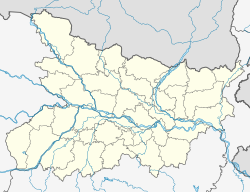This article needs additional citations for verification. (June 2013) |
Mohiuddin Nagar is a block and a notified area in Samastipur district in the Indian state of Bihar, India. It derives its name from Sufi saint Shah Afaq Mohiuddin. He was descendant of Shah Qasim Suleiman of Chunar. Earlier this area was known as Sheher Dharhara. There is a fort named Amina Bibi ka Quila commonly known as Fansighar. She was the wife of Shah Afaq and daughter of rebel Afghan general Shamsher Khan who was killed in battle of Ranisarai with Nawab Alivardi Khan.
Mohiuddin Nagar | |
|---|---|
Block | |
| Mohiuddin Nagar | |
| Coordinates: 25°35′N 85°40′E / 25.583°N 85.667°E | |
| Country | |
| State | Bihar |
| District | Samastipur |
| Population (2001) | |
• Total | 13,764 |
| Languages | |
| • Official | Hindi, |
| • Additional official | Urdu |
| • Regional | Angika |
| Time zone | UTC+5:30 (IST) |
Demographics
editAs of 2001[update] India census,[1] Mohiuddin Nagar had a population of 13,764. Males constitute 52% of the population and females 48%. Mohiuddin Nagar has an average literacy rate of 44%, lower than the national average of 59.5%: male literacy is 52%, and female literacy is 35%. In Mohiuddin Nagar, 21% of the population is under 6 years of age. The market of Mohiuddin Nagar is famous between their nearest village.There is no need to go out for a resort wedding in our place
Famous Places
editThe market is full with crowd of different requirements. around 22 villages are near by to whom this market is backbone.
School
editGovernment High School, Mohiuddin Nagar
Pipal Tree
editThere is famous ~ more than 200 years old pipal tree situated in middle market near post office. There is a small temple which was built around 60 years ago.
References
edit- ^ "Census of India 2001: Data from the 2001 Census, including cities, villages and towns (Provisional)". Census Commission of India. Archived from the original on 16 June 2004. Retrieved 1 November 2008.
